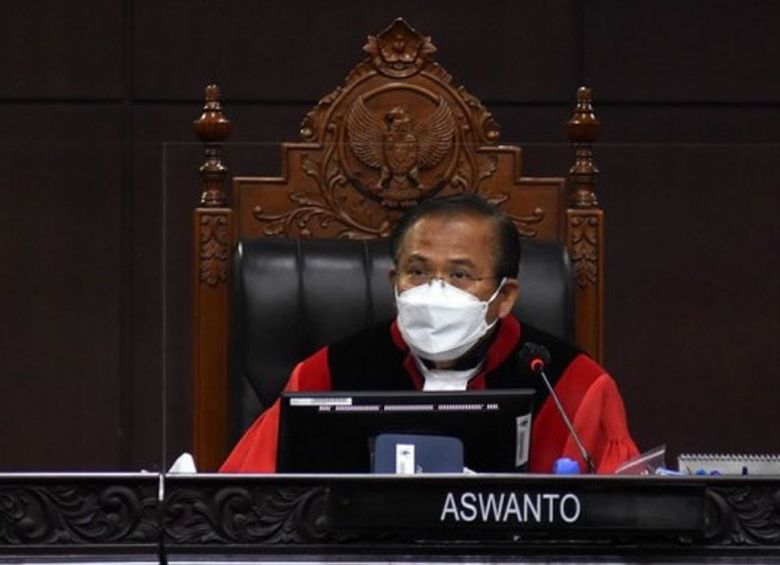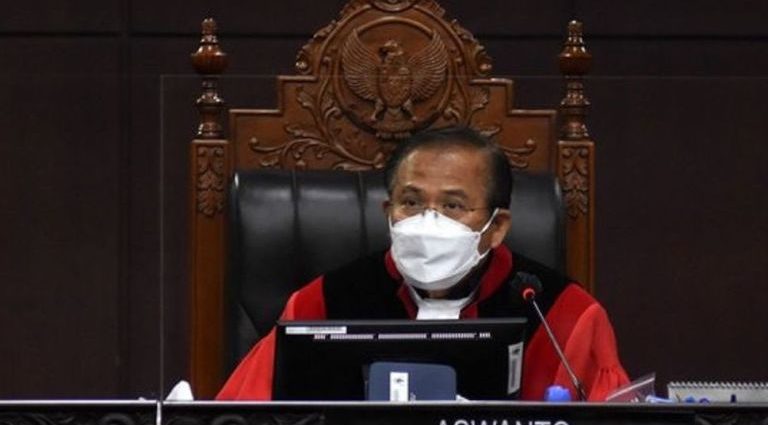JAKARTA – President Joko Widodo has hinted that he will not sign off on efforts by the House of Representatives (DPR) to dismiss one of the Constitutional Court judges who ruled that the ground-breaking 2020 Job Creation Law needed to undergo a further review before it could be implemented.
“We all have to abide by the rules (laid down) by the Constitution and the law,” Widodo said recently in a strong sign that Parliament’s surprise action, considered by a range of legal experts to be both illegal and unconstitutional, is likely going nowhere.
Seen as crucial to doing an end-run around the bureaucracy and attracting more foreign investment, the new law was clouded in controversy from the start, not only because of its novel approach but also because it failed to address labor and environmental issues.
Widodo may have sought advice from the Supreme Court, which in an October 11 statement said it would not be replacing its three nominees on the Constitutional court, including chief justice Anwar Usman, who is married to Widodo’s sister-in-law.
Previously, Jimly Assidique, the respected chief justice of the first Constitutional Court, had warned the president that he would be acting unconstitutionally if he issued a presidential instruction approving the dismissal.
He pointed out that under Constitutional Court Law, a justice can only be replaced if it can be shown he has committed a legal or ethical violation, which must be laid out in a formal letter to the DPR from the chief justice.
The attempt by the DPR to sack 58-year-old deputy chief justice Aswanto, who has seven years still to run in his 15-year term, is Parliament’s retribution for the court returning the omnibus legislation a year after it was voted into law.

Aswanto assumed office in March 2014 after being nominated by a different Parliament during Susilo Bambang Yudhoyono’s administration, rising to deputy chief justice in 2018 without any known blemishes on his record.
“The court should just ignore it and leave it at that,” says former attorney-general and ex-Golkar Party legislator Marzuki Darusman, who confessed he was “dumbfounded” by a move that would deal another damaging blow to democratic rule.
The case has given rise to speculation that some of the country’s political parties may be trying to change the composition of the nine-strong bench ahead of the 2024 elections when they will have a key role to play in electoral disputes.
In a November 2021 ruling, Aswanto was among five of the nine justices who called for more public hearings and held that the concept of an omnibus bill, amending a long list of laws seen to be a barrier to investment, was not provided for in Indonesian statutes.
The court also prohibited the government from issuing far-reaching strategic policies and new all-important implementing regulations related to the legislation, although regulations that had already been issued were allowed to remain in force.
Aswanto is one of three members of the country’s highest court to be nominated by Parliament, which law commission chairman Bambang Wuryanto, argued meant he was there to serve the interests of the legislature “like a director on a board.”
After three parliamentary terms dating back to 2004, the veteran Indonesian Democratic Party for Struggle (PDI-P) lawmaker seemed strangely unaware of the basic democratic principle separating the powers of the judiciary, legislature and executive.
“This is a political decision,” Wuryanto was quoted as saying, sparking fears that if Aswanto was replaced by Constitutional Court secretary-general Guntur Hamzah, the government and the Supreme Court, who nominate the six other justices, may try to follow suit.
“Basically, he is saying the constitutional court judges nominated by the DPR can be recalled at any time,” says one Indonesian lawyer, noting that if that view was a proper interpretation of the law, “which is absolutely not the case,” it would paralyze the institution and leave it at the mercy of venal politicians and interest groups.
Despite strong opposition from activists worried about the impact of the new law on labor welfare and environmental degradation, the court’s decision rested on what it said were insufficient public hearings and the omnibus model itself.

The way democracy has evolved in Indonesia, most of the eight parties represented in Parliament have ended up in the ruling coalition, with only the Islamist Justice and Prosperity Party (PKS) and former president Susilo Bambang Yudhoyono’s centrist Democrat Party forming an ineffective opposition.
Given the spoils of office, that is likely to continue. Indonesians are culturally averse to a political opposition anyway, seeing it as potentially confrontational and therefore an inherent danger to political stability.
Assidique and eight other former justices urged Widodo to ignore the DPR’s decision to fire Aswanto and replace him with Hamzah, who now says he went through a hurried parliamentary fit and proper test without being told who he was replacing and why.
Aswanto and another DPR nominee, Justice Wahiduddin Adams, were among the five judges who supported the decision to send the omnibus law back to Parliament, a move that caught the government off guard and scrambling to comply.
Those with dissenting opinions were Usman and Manahan Sitompul, both nominated by the Supreme Court, Arief Hidayat (another DPR nominee) and presidential choice Daniel Yusmic Foekh.
The government addressed one of the court’s concerns last May by hastily passing an amendment to a 2011 law governing legislative procedures, which allows for the formulation of laws using the omnibus method.
That was an idea originally conceived by former agrarian minister Sofyan Djalil, a graduate of the US Fletcher School of Law and Diplomacy who served in Widodo’s 2014-2019 Cabinet.

Bold and ambitious, it finally emerged as a 900-page legislative blueprint for slicing through red tape strangling the Indonesian economy as Widodo pursues his dream of seeing Indonesia become an advanced country with a gross domestic product (GDP) of US$9 trillion by 2045.
Addressing the court’s second instruction, ministries and local governments have been conducting public hearings across the country to listen to any input and to respond appropriately.
A member of a special team set up to monitor the implementation of the law says the government will submit to the court “all the administrative proof that the government has done a wide range of hearings.”

